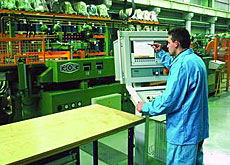ABB stays in the red, but expects upturn

The Swiss-Swedish engineering group ABB has announced a net loss of $767 million (SFr948 million) for 2003, its third in as many years.
But the company says its expects more profitability and a growth in demand for 2004.
Despite the weak bottom line, sales rose slightly to $18.80 billion, helped by the weak dollar and higher revenues from ABB’s core automation and power technologies units.
The result was largely in line with market expectations, although some analysts had not predicted such a heavy loss.
“The core divisions turned in another strong performance in mixed markets,” said CEO Jürgen Dormann in a statement on Thursday.
“For the full year the core divisions generated almost $1.5 billion in cash. Those are significant achievements,” he added.
The Zurich-based firm said it saw continued growth in demand in 2004 and expected to see further improvement in profitability.
“Driving operation improvements further and finalizing the divestment programme will remain our priorities in 2004,” said Dormann.
Expected
Sebastien Petit, an analyst with Barclays in London, said the results were not a surprise and showed ABB was on the right track.
“This is very reassuring for ABB, basically it’s business as usual with the core business – power technologies and automation technologies – improving on margins and sales and with losses on operations which are to be sold remaining a drag on the group’s performance,” Petit told swissinfo.
He added that the losses in the oil and gas business had been expected and had been flagged by the company at the beginning of the year.
The outlook for 2004 was looking very positive for ABB, Petit said.
“Basically 2003 was heavily affected by provisions, restructuring and asbestos charges that should be strongly reduced in 2004.
“If the core businesses continue to grow and improve margins then ABB should return to profit in 2004.”
Asset sales
Analysts had expected ABB to announce a net loss of between $500 and $600 million, as it continues to battle its way through an ambitious restructuring programme.
After almost collapsing in 2002, ABB’s management have been selling off assets to help reduce a multi-billion dollar debt mountain left over from a buying spree in the late 1990s.
A major hurdle was cleared in January, when Dormann announced the sale of most of ABB’s oil, gas and petrochemicals division for $925 million.
The sale was at the centre of Dormann’s pledge to creditors that ABB would cut around $2 billion off the firm’s $8.5 billion debt bill before the end of 2003.
Asbestos
One of the causes of ABB’s money problems is asbestos litigation in the United States.
But ABB said it remains confident it will be able to settle the claims this year.
Its US subsidiary Combustion Engineering filed for bankruptcy protection in 2003 after over 90 per cent of 111,000 plaintiffs accepted a $1.2 billion settlement plan.
A hearing date for the plan was set for February 4, but was postponed.
Down-to-earth
ABB, which was once considered a business-school model of how a global firm should be run, has changed fundamentally in the past two years.
At its peak, ABB employed more than 150,000 people around the world. Currently, it has around 115,000, and once Dormann completes the current restructuring, the workforce is expected to be closer to 100,000.
Gone also are the company’s ambitions of becoming the European equivalent of America’s GE.
ABB is actively concentrating on robotics and power generation systems, having sold off its financing and building businesses.
swissinfo
The 2003 net loss was $767 million (SFr948 million).
Sales rose eight per cent on 2002 to $18.80 billion.
Analysts had expected a net loss of between $500 and $600 million.
ABB has been restructuring since 2002, when it almost collapsed under a $9 billion debt mountain.
With roots dating back more than 120 years, ABB was formed in 1988 through a merger between Sweden’s Asea and the Swiss group, Brown Boveri.
To reduce costs the company cut 7,100 jobs worldwide last year and now employs 115,000 workers in 100 countries.

In compliance with the JTI standards
More: SWI swissinfo.ch certified by the Journalism Trust Initiative










You can find an overview of ongoing debates with our journalists here . Please join us!
If you want to start a conversation about a topic raised in this article or want to report factual errors, email us at english@swissinfo.ch.